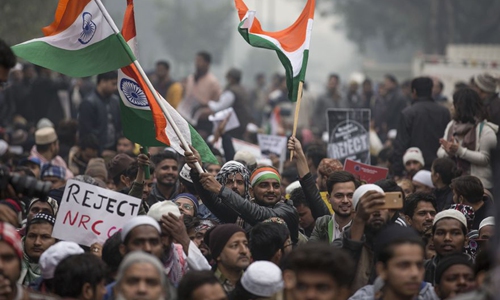HOME >> WORLD
Massive protests break out in Indian capital against controversial citizenship law
Source:Xinhua Published: 2019/12/20 20:36:21

People participate in a protest against the new citizenship law in New Delhi, India, Dec. 19, 2019. Photo:Xinhua
Massive protests Friday broke out across Indian capital city Delhi against the controversial new citizenship law, officials said.
Though authorities have imposed prohibitory orders, however, people have assembled at Jama Masjid (grand mosque), Jamia Millia Islamia (JMI) and Seelampur and staged protests.
According to officials, the protests began immediately after the Friday afternoon congregational prayers.
Authorities have deployed huge police force to prevent the protesters from taking to roads. The officials have also closed the entry and exit gates of Chawri Bazar, Lal Quila and Jama Masjid.
According to Delhi Metro Rail Corporation (DMRC) trains will not be halting at the stations close to Jama Masjid.
Call for a march from Jama Masjid to Jantar Mantar was given by Bhim Army chief Chandrashekhar Azad, a young Dalit leader. Bhim Army claims to be the following Indian independence hero and Dalit icon Bhimrao Ambedkar.
The Delhi Police had denied permission to Azad's protest march against citizenship law. But he wrote on social media that he would make it to the venue.
"Please ignore the rumours of my arrest. I am reaching Jama Masjid," Azad wrote on twitter.
Azad emerged from the stairs of the mosque along with his supporters after the prayers shouting slogans and holding a photograph of Ambedkar. Azad read out the preamble to India Constitution, with the crowd chanting alongside.
Reports from Seelampur said a huge crowd has gathered against the law shouting slogans. Authorities have deployed contingents of Rapid Action Force to contain the situation. Administration has prohibited assembly of people in large numbers in 12 police station areas of northeast Delhi.
Police have also carried out a flag march in the Seelampur which witnessed violence recently during protests. Police are also using drones to keep a tab on the law and order situation at various places in the city.
Earlier, in the morning police detained activists and leaders of women Congress party wing outside the home of federal Home Minister Amit Shah. The protesters were demanding revocation of the controversial citizenship law.
Several places of neighbouring Uttar Pradesh also saw violent protests despite the imposition of prohibitory orders by the local government.
The protests over the new law initially began in India's northeast last week have spiralled to other states across the country.
On Thursday three people, two in Karnataka and one in Uttar Pradesh, were killed during these protests, following which authorities in both the states banned mobile internet and text messaging in sensitive places.
Last week four people were killed in police firing in Assam during the similar protests.
Protests erupted across India and inside universities against the new citizenship law last week after Indian parliament passed the law.
The law aims at granting citizenship to illegal immigrants belonging to six religions - Hinduism, Sikhism, Buddhism, Jainism, Parsi and Christianity - from Bangladesh, Afghanistan and Pakistan. However, it has kept out Muslim immigrants from applying for citizenship.
Posted in: CENTRAL & SOUTH ASIA